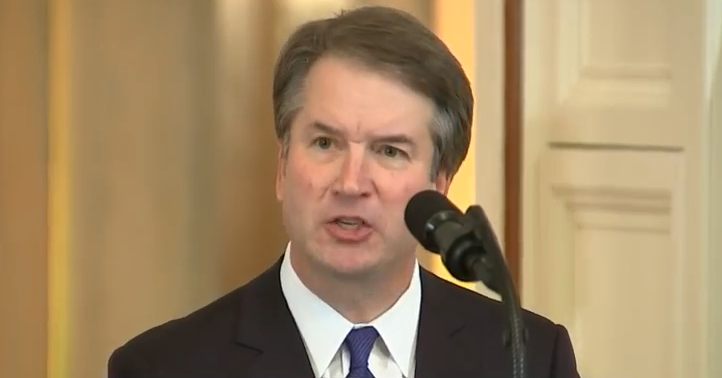The sudden announcement of Supreme Court Justice Anthony Kennedy’s retirement was the moment the baleful consequences of Donald Trump’s election were made fully manifest. Until then, the worst damage the president could do was to stall progress on urgent matters like climate change, damage the lives of a few thousand migrant families and DACA recipients, botch the response to Hurricane Maria and pass some reversible corporate tax cuts. That’s not nothing, but it still pales in comparison to the catastrophic invasion of Iraq.
But much like the Iraq war, replacing Justice Kennedy with an arch-right Federalist Society conservative will have damaging consequences for the country for decades to come.
We know, of course, the story behind Mitch McConnell’s breathtaking perfidy in breaking the Senate confirmation process denying a hearing for Obama’s pick for the Court to replace the late Antonin Scalia for nearly a year, betting on the outside chance of a Republican presidential victory. Due to what is now known as the McConnell Rule, it seems likely that no president in the future will be able to push through a Supreme Court appointment without his or her party also holding the Senate.
But the details of Kennedy’s retirement and Trump’s pick of a successor are also starting to come into focus. The circumstances were a little strange: after a career of often moderate if poorly reasoned jurisprudence, Kennedy tacked hard right in his final decisions and then abruptly quit. Much has been made of Justice Kennedy’s son being the point person at Deutsche Bank in lending Trump millions of dollars he could not easily get elsewhere–and though this is likely happenstance, the possibility of a connection cannot be discounted.
More importantly and less far-fetched, Trump had been pressuring Kennedy to resign for some time. The motivations of longtime conservative activists on this front are obvious, of course, but it has been less clear why Trump himself should care so badly. After all, the president’s most effective insurance against a revolt from his own party is the fact that he holds the power to nominate justices. Why rush it?
What’s more interesting is that Trump had apparently had his sights on appeals court judge Brett Kavanaugh from the beginning. A Senate Judiciary Committee questionnaire reveals that Kavanaugh received a call from the White House mere hours after Kennedy’s announcement, and Kavanaugh clearly had the inside track throughout the process.
By now we know enough about how Donald Trump operates to strongly suspect that such single-minded focus has strings attached. Trump is famous for demanding personal loyalty from all around, and we know that the Mueller probe torments his thoughts at all times. There can be no doubt that he views the key qualifications for a Supreme Court nominee the same way he views them for every other government employee he hires: absolute loyalty to himself and a willingness to protect him and enact his agenda.
Which leads us to today’s not-so-shocking revelation about Kavanaugh’s opinions on executive power and the ability of special counsels to hold them accountable for crimes:
Supreme Court nominee Brett Kavanaugh suggested several years ago that the unanimous high court ruling in 1974 that forced President Richard Nixon to turn over the Watergate tapes, leading to the end of his presidency, may have been wrongly decided.
Kavanaugh was taking part in a roundtable discussion with other lawyers when he said at three different points that the decision in U.S. v. Nixon, which marked limits on a president’s ability to withhold information needed for a criminal prosecution, may have come out the wrong way…
“But maybe Nixon was wrongly decided — heresy though it is to say so. Nixon took away the power of the president to control information in the executive branch by holding that the courts had power and jurisdiction to order the president to disclose information in response to a subpoena sought by a subordinate executive branch official. That was a huge step with implications to this day that most people do not appreciate sufficiently…Maybe the tension of the time led to an erroneous decision,” Kavanaugh said in a transcript of the discussion that was published in the January-February 1999 issue of the Washington Lawyer.
Needless to say, Kavanaugh’s opinions on the inviolability of executive power even to cover up its own criminal acts are well outside the mainstream of even conservative legal thought.
Can there be any doubt that this fact was highly influential in causing Trump to settle on him so early?



